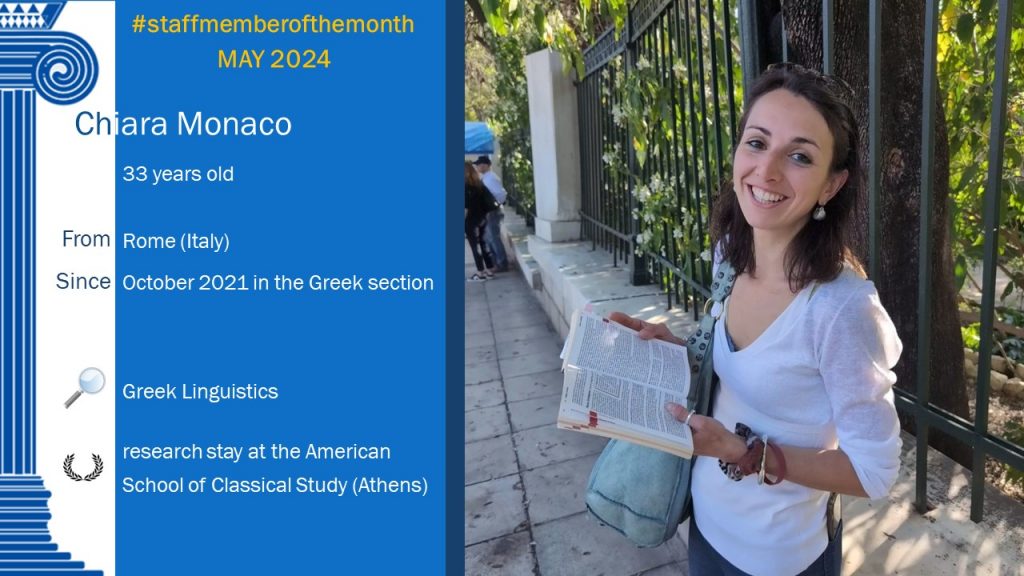The staff member of the month is Chiara Monaco, who joined the Linguistics Department of UGent in 2021 with an FWO junior postdoctoral fellowship. Yasmine had a virtual chat with Chiara and asked her all about Athens, where she is currently spending two months as a fellow of the Gennadius Library at the American School of Classical Study.

Hi Chiara! Or, as you’re currently in Athens, καλημέρα! Can you tell us what you are doing there?
Apart from eating, sunbathing and drinking ouzo, I am a fellow of the Gennadius Library at the American School of Classical Study. I am working at the Gennadius Library, which is extremely well-equipped with modern Greek sources, especially in relation to the Greek language question, which is the focus of my research. The founder of the library was quite crazy about languages and language-related issues, so he built up a huge library with all sorts of treasures for people interested in the history of the Greek language, and not only! The library is also beautifully situated on the slopes of Mount Lycabettus, which makes a visit all the more worthwhile.
I am working at the Gennadius Library, which is extremely well-equipped with modern Greek sources, especially in relation to the Greek language question, which is the focus of my research.
Congratulations! It is an incredible opportunity – and definitely something that make your colleagues jealous… How is your ordinary day in Athens? Do you happen to have any local tips?
My ordinary day is actually quite extraordinary, as I have the opportunity to walk around Athens every morning to get to the library (sometimes with some deviations), passing by the main attractions and stopping at a café along the way. Our Greek colleagues have done a great job of passing on their knowledge of museums, tavernas and cafes, and I am happy to share this very important piece of knowledge with anyone planning a trip or research stay in Athens (both highly recommended!). I guarantee the quality!
Looking forward to hearing more once you’ll be back! Just before leaving, you took part in the “Bloemlezing van Aristophanes’ Vrouwenparlement”, an event organized by members of the Greek Section on March 20. I heard it was a great success! What was your role in it?
I had the pleasure of teaching students about Aristophanes and political satire in a workshop organised with our colleague Eleonora Cattafi. We tried to explain the political relevance of ancient comedy with references and comparisons to modern political satire (and a good dose of memes), all the while wearing very fancy Dali-style moustaches, which gave our look an interesting kick. It was a very nice and enriching experience, firstly because it gave us a different perspective on our studies, and also to promote the study of ancient languages among young students. Evelien Bracke and Katrien Vanacker do a great job in organising these events, which, however, require a lot of energy and time, so I think it should be a more collective effort, even more so to enjoy the collective reward of seeing more students in our department!
We tried to explain the political relevance of ancient comedy with references and comparisons to modern political satire (and a good dose of memes), all the while wearing very fancy Dali-style moustaches, which gave our look an interesting kick.
Most of the time, though, you are not wearing a fake moustache to debate about gender issues, but you are sitting at your desk with a pile of books by your side. You joined the Linguistics Department of Ghent University with an FWO postdoctoral fellowship a few years ago. What is your project about? And what do you find to be the most challenging and rewarding in your research?
My project falls within the framework of the Greek language debate about what kind of language should be used for writing and then as a national language. The timeframe is quite broad, as the debate runs through the history of the Greek language, at least from the Hellenistic period to modern times. While for my PhD I focused on the Hellenistic and Imperial periods, for my FWO I jumped a few years forward to study an influential early nineteenth-century theory, the so-called Aeolodoric theory, which defended the use of Modern Greek in writing by seeing it as a mixture of ancient Aeolian and Doric dialects. It is very interesting to note that this theory is based on linguistic theories that were formulated in the Hellenistic period and reused at different stages of the Greek language and were still very much in vogue at the beginning of the 19th century. This gives us an idea of the continuity of linguistic approaches and ideologies from antiquity to modern times. Quite an interesting subject for a classicist interested in modernity, especially as the language question is still a hot topic in Greece today! Despite the many challenges, dealing with such a long timeline carries the risk of applying a modern perspective to ancient sources and vice versa. This is one of the trickiest parts, but it also brings the best reward: the chance to follow the latest episodes!
From Rome to Ghent, passing through Cambridge and with a stop in Athens… What’s next?
I wish I could tell you now, but at the moment I only know that I have a number of applications to send in. In the meantime, I will continue to enjoy Ghent, my friends, my colleagues and the university environment, which is very stimulating. And next year I will probably take the opportunity for another research stay somewhere else!
Thank you very much, Chiara! And enjoy a Greek iced coffee for us as well!